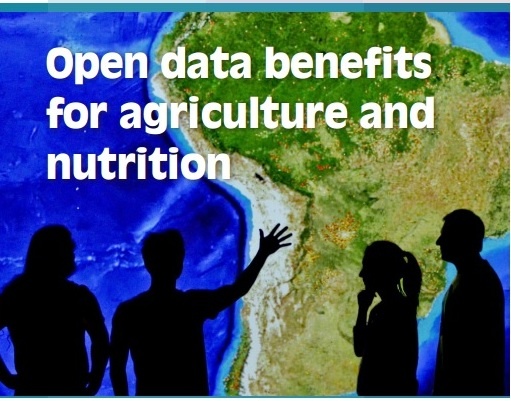Data Sharing : towards real impact in agriculture and nutrition
10/03/2017


(Photo credit: Exploring the impacts of open data in agriculture and nutrition, CTA)
The third edition of the international workshop ‘Creating impacts with open data in agriculture and nutrition’ was held in The Hague, 13-15 February, 2017. The importance of developing frameworks and models to promote the benefits of data sharing across the data value chain - incorporating the rights of the least-favoured - was emphasized.
____________________________________________________________________________________________________
|
Organizers: |
The Dutch Ministry of Economic Affairs, CABI, GODAN, CTA, and Wageningen UR. |
|
Actions discussed:
|
|
The workshop resulted in an overall action plan for the coming years to be implemented by all the stakeholders that consider OD as important. In this context, models and frameworks that make benefits of OD and data sharing explicit across the data chain, need to be developed, just as the rights of all players need to be ensured.
OD can bring actors together across the supply chain or in multilateral or multi-institutional government processes, like, for example, in roundtables on sustainable palm oil and soya.
By jointly sharing and discussing the importance of data, the parties can build trust and examine new models for collaboration.
With more data available, and - as a result - with more options for data-based decision-making, organisations might need to change their own organisational structures.
For example, the more open weather data is available through met offices, intermediaries (e.g. small and medium enterprises, farmers’ cooperatives) will build services on these data (view: GLOFAS service), which in turn can be used by farmers to plan their farm operations, and result in a de-risking of agriculture.
The chain to impact by means of open nutrition data is much more complex, as many different steps can be measured in the distribution and processing of food and many links are possible to health, hygiene and agriculture.
Biodiversity data extracted from observations (distributed across large networks of crowdsourcing and citizen-driven science) could potentially offer insight on local-specific contributions to agriculture productivity, for example, assessing the degree of a bee-friendliness as a crucial pollinator for agricultural crops.
It was recognized that to get data all together is often a complex task. However, it is possible by better targeting of nutrition interventions by public bodies.
The participants discussed the importance of targeted actions to:
- document stories of data sharing, as well as shifting revenue models, benefits and risks in the private sector;
- develop - thought provoking materials on supply chain changes and industry - collaboration through (open) data/digitisation;
- establish a cross sector focus group on private sector to open-up their own data;
- disseminate successful business models based on OD to firms in the service sector.
The Sustainable Development Goals (SDGs) have been widely recognised as an important goal setting mechanism towards sustainability.
Anyhow, "Sustainability rests on the principle that we must meet the needs of the present without compromising the ability of future generations to meet their own needs. Therefore, stewardship of both natural and human resources is of prime importance",- National Sustanaible Agricultral Coalition.
The link between SDG2 (End Hunger) and OD is discussed in the paper:
# Towards a data users’ framework to advance Sustainable Development Goal 2,
launched by the GODAN Accountability Framework for SDG2 and linked to data that was developed jointly with the One Campaign.
# GODAN has pulled together some Open Datasets which relate to agriculture and nutrition that you may want to consider. This is a result of the GODAN Open Data Challenge 2016.
Further actions identified were on developing a paper on the mechanisms with which OD can help to reach the SDGs, building partnerships for transforming agriculture towards SDG2 with OD, and developing innovative show cases of private sector, project and programme contribution towards SDG2 with new data sources.
Capacity building was discussed from two perspectives:
- by using OD that is available (demand) and
- by producing OD and intermediaries which consume OD to develop different services (supply).
In this framework, it was recognized that:
- local conditions and context are extremely important to tailor efforts in capacity development;
- there is still a lot to be gained in training basic skills in data literacy;
- capacity development should be done from the perspective of the end-user, to help better in achieving the desired impacts.
____________________________________________________________________________________________________
Source: Actions to turn the power of Open Data into real impact (ICT update, CTA)
Learn more about Open data benefits for agriculture and nutrition (February 2017 ı ICT Update ı issue 84).
____________________________________________________________________________________________________
Related content:
- Join Online Forum (6-27 March): The Role of ICTs in Sustainable Crop Production Intensification of horticulture crop based system
- GODAN Local Farming Challenge 2017
- Land Debate on Open Data and Land Governance
- Ghana has been selected to host the Second Africa Open Data Conference (AODC) In July 2017
- Love Your Data International Week 2017
- The State of Open Data: Report Provides New Insights into the Global State of Open Data (FigShare, 2016)
